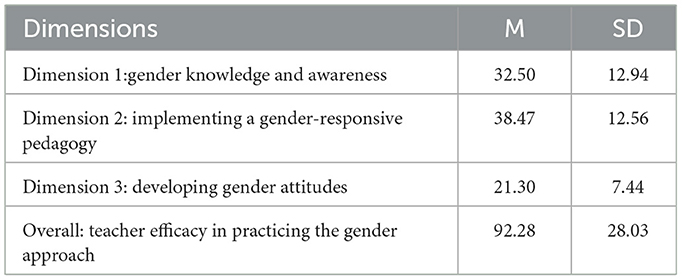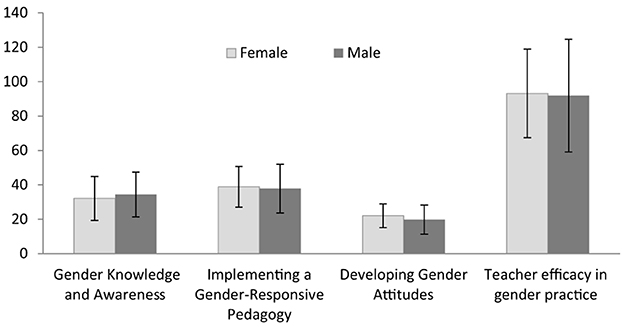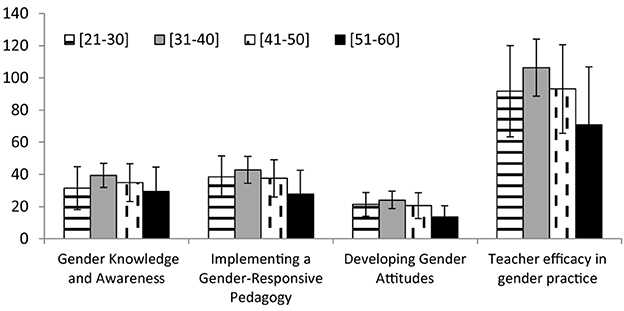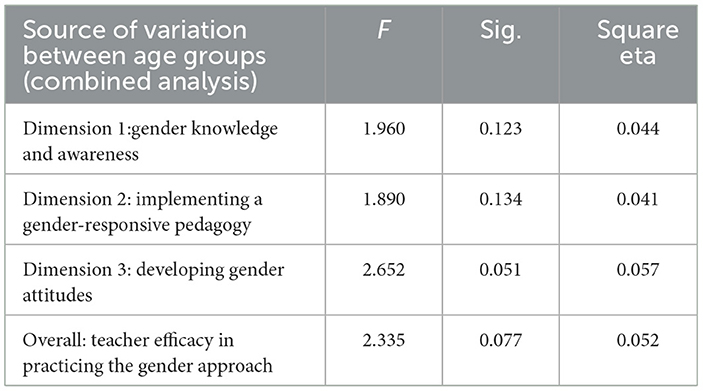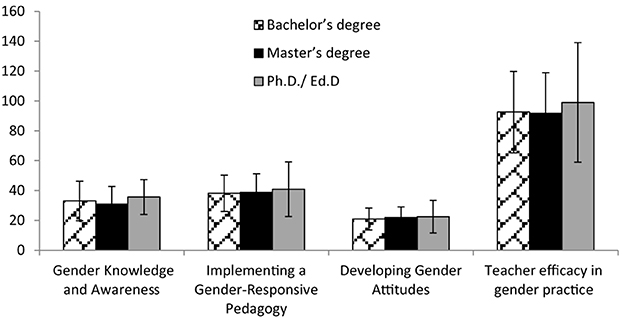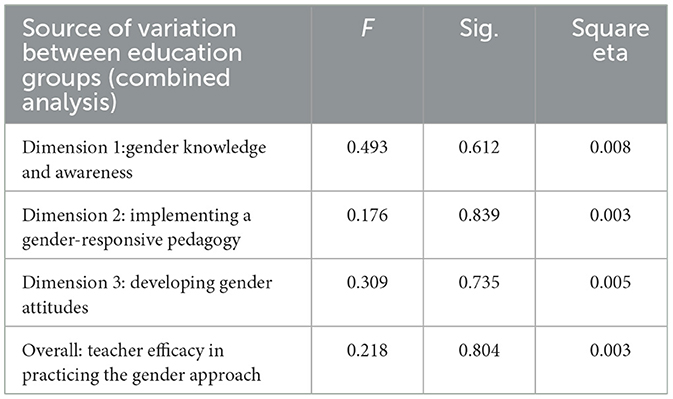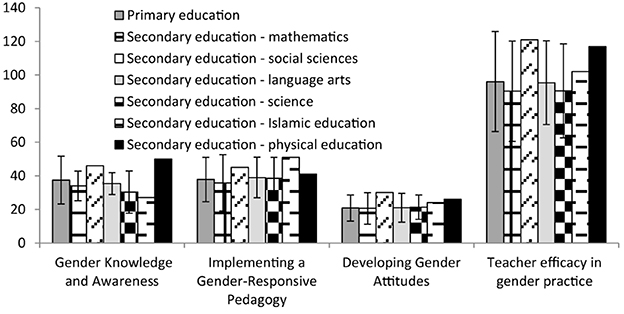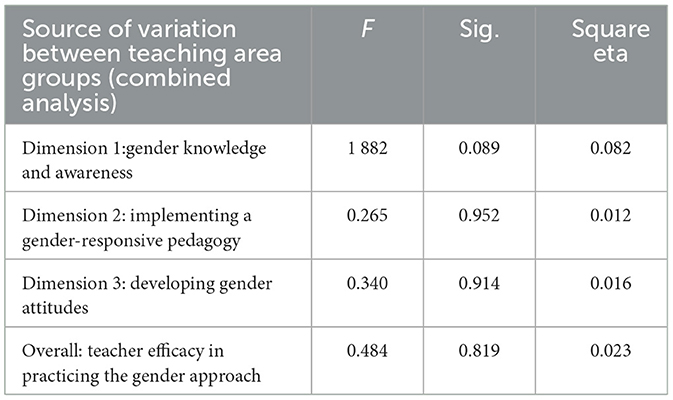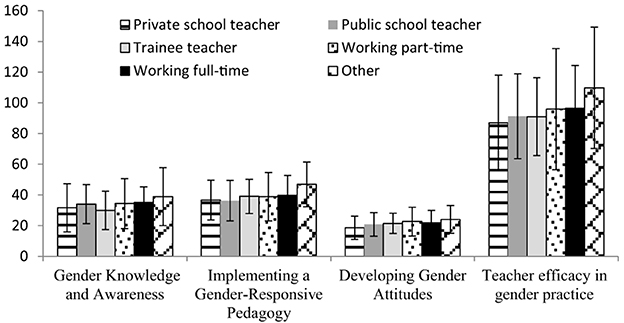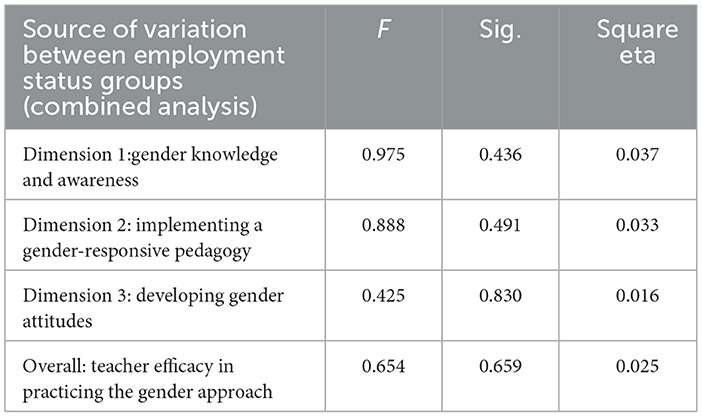- 1Research Team of Employability of Science and Engineering Education and Training (ESIEF), Regional Center for Education and Training Professions (CRMEF) Casablanca-Settat, El Jadida, Morocco
- 2Laboratory of Interdisciplinary Research in Science, Education and Training (LIRSEF) – Higher School of Education and Training (ESEF) Berrechid, University Hassan 1er Settat, Berrchid, Morocco
- 3Laboratory of Computer Science and Interdisciplinary Physics (LIPI) - Higher Normal School (ENS), Université Sidi Mohammed Ben Abdellah de Fès, Fes, Morocco
Gender equality in education is crucial for sustainable development and the realization of fundamental human rights. Gender-responsive pedagogy seeks to promote equal opportunities for all students, regardless of gender, by fostering an inclusive and respectful learning environment. This study, conducted as part of the HEP-Morocco project in collaboration with USAID and Arizona State University (ASU), examines the efficacy of Moroccan teachers and future teachers in implementing gender-responsive pedagogy. Specifically, it explores their awareness of the gender approach (Dimension 1), its application in teaching practices (Dimension 2), and the development of gender-related behaviors (Dimension 3). To assess these dimensions, a validated 31-item questionnaire was administered to 135 teachers and future teachers from the Casablanca-Settat regional academy. The findings indicate that awareness, implementation, and behavioral development related to gender-responsive pedagogy are at a clear level. Likewise, teachers' overall efficacy in applying the gender approach was found to be moderate (M = 92.28, SD = 28.03). The students-test and ANOVA analysis revealed no significant differences in these dimensions based on demographic factors such as gender, age, education level, teaching field, or employment status. However, statistically significant correlations were found between teachers' overall efficacy in practicing gender-responsive pedagogy and their knowledge, teaching methods, and developed behaviors, suggesting that these elements are closely interconnected.
Introduction
Access to education is a fundamental right for all, regardless of gender, and ensuring a safe, inclusive learning environment is essential. International organizations such as the United Nations (1980, 1985, 1995) have long recognized the importance of gender equality in education, leading to increased awareness of gender dynamics and their impact on educational practices. This has given rise to gender-responsive pedagogy, an approach that acknowledges and addresses gender differences and inequalities to foster an inclusive and equitable learning environment (Gabriel, 2021).
According to theories on the social construction of gender, gender is not merely an individual characteristic but a continuous performance shaped by social and institutional interactions (Bandura, 1986; West and Zimmerman, 1987). Within the school environment, teachers play a pivotal role in promoting gender equality by integrating gender-responsive pedagogical practices. However, they may also inadvertently reinforce or challenge gender stereotypes through their teaching methods (Egenson and Knoll, 2016). Therefore, it is crucial to provide teachers with training and awareness programs that encourage inclusive teaching practices and challenge gender biases (Andrews et al., 2021).
Achieving gender equality in education goes beyond equitable access; it also encompasses curriculum content, pedagogical approaches, teaching methods, classroom interactions, group dynamics, assessment strategies, and overall teaching quality (World Bank, 2017, 2018; Jarlégan, 2009). Integrating gender equality courses into teacher training programs is essential to reducing stereotypes and fostering equitable education (Council on the Status of Women, 2016, 2017). Additionally, creating gender-inclusive school environments—such as providing separate facilities for girls and boys and increasing the presence of female teachers—can further support gender equality (Inter-Agency Network for Education in Emergencies, 2010).
Despite these efforts, research indicates that many teachers lack sufficient training on gender issues and may unknowingly perpetuate gender biases in the classroom (Smith et al., 2007). Teacher training programs vary significantly in their approach to gender-responsive pedagogy, leading to disparities in teachers' awareness and skills in implementing gender-responsive teaching strategies (Reader, 2013).
Morocco has demonstrated a strong commitment to gender equality in education, as reflected in its adherence to international agreements such as the Convention on the Elimination of All Forms of Discrimination against Women and the Convention on the Rights of the Child (United Nations, 1985). Furthermore, Morocco's commitment to UNESCO's Sustainable Development Goals (SDGs) has been evident in its education reforms, particularly in ensuring universal schooling for both boys and girls, with a focus on improving education for girls in rural areas.
The National Charter for Education and Training (1999) serves as a key framework for Morocco's education system, outlining measures to enhance girls' enrollment, reduce school dropout rates-especially in rural areas-and eliminate gender disparities in access to education. Additional efforts, such as the Tayseer program providing direct financial support to families, the “Dar Taliba” program, have helped promote the schooling of rural girls by providing them with safe accommodation near educational institutions, thereby reducing dropout rates (Sadiqi, 2008). Similarly, the 2004 reform of the Moudawana raised the legal age of marriage for girls to 18, strengthening their rights and indirectly supporting the continuation of their education (Charrad, 2012).
Problem statement
Gender-responsive pedagogy aims to raise teachers' awareness of gender dynamics in classrooms and equip them with strategies to foster inclusive learning environments where all students feel valued, regardless of gender (Huang, 2013). While there is growing recognition of the significance of this approach, research on pre-service teachers' self-efficacy in applying gender-responsive pedagogy remains limited.
Despite progress in promoting gender-responsive education, several challenges persist. These include a lack of teacher training programs focused on gender issues, limited resources, institutional and cultural resistance, and varying levels of stakeholder awareness and engagement (Dee, 2007).
This study aims to assess the self-efficacy of pre-service and practicing teachers in the Casablanca-Settat region of Morocco regarding gender-responsive pedagogy. Specifically, it examines their perceptions, attitudes, and beliefs about applying gender-responsive teaching strategies in education. The study also seeks to provide recommendations for strengthening teacher training and advancing more equitable and inclusive education in Morocco.
Research questions
This study is guided by the following research questions:
• What is the level of gender awareness among Moroccan teachers and future teachers?
• To what extent do gender knowledge and awareness, the implementation of gender-responsive teaching methods, and the development of gender-related attitudes and behaviors among Moroccan teachers and future teachers vary based on key demographic factors (e.g., gender, age, academic level, teaching field, and professional status)?
• Does the effectiveness of Moroccan teachers and future teachers in practicing gender-responsive pedagogy differ according to demographic variables such as gender, age, academic level, teaching field, and professional status?
• What are the correlations between teachers' knowledge and awareness of gender, their implementation of gender-responsive teaching methods, their development of gender-related attitudes and behaviors, and their overall efficacy in practicing gender-responsive pedagogy?
Research objectives
The primary goal of this study is to assess the awareness and efficacy of Moroccan teachers and future teachers in gender-responsive pedagogy. Specifically, it aims to:
• Evaluate the extent to which teachers and future teachers effectively integrate gender-responsive pedagogy into their teaching practices.
• Analyze the impact of demographic factors (gender, age, academic level, teaching field, and professional status) on teachers' efficacy in implementing gender-responsive pedagogy.
• Investigate the relationships between teachers' gender awareness, their application of gender-responsive teaching methods, their development of gender-related attitudes, and their overall effectiveness in promoting gender-responsive education.
• To assess the level of effectiveness of teachers and future teachers in implementing the gender approach.
The significance of the study
The significance of this study lies in its potential to provide critical insights for enhancing Moroccan teacher training programs and shaping educational policies that promote gender equality. By gaining a deeper understanding of the challenges and opportunities associated with integrating gender-responsive pedagogy, policymakers and teacher educators can develop targeted interventions to better support teachers in fostering inclusive learning environments.
Furthermore, this study will enhance understanding of pre-service and in-service teachers' self-efficacy in applying gender-responsive pedagogy in Moroccan classrooms. The findings will inform the design and implementation of teacher training programs, ensuring that educators are equipped with the necessary skills and strategies to create equitable and inclusive educational experiences for all students.
Conceptual framework
Introducing gender-responsive pedagogy
Gender-responsive pedagogy is an educational approach designed to promote gender equality by recognizing and addressing the different learning experiences and needs of students based on their gender (UNESCO, 2015a). This approach acknowledges that gender identities and roles are socially constructed and can significantly influence classroom interactions, teacher expectations, and student learning processes (Unterhalter, 2005). By challenging gender stereotypes and encouraging diversity, gender-responsive pedagogy aims to create inclusive learning environments where all students, regardless of gender, feel respected, valued, and supported in their educational journey (Dee, 2007).
The adoption of gender-responsive pedagogy is critical to ensuring equity and inclusion in education. All students, regardless of gender, should have the opportunity to thrive in school (Mukagiahana et al., 2024). This pedagogical approach fosters a safe and respectful learning environment (Ananga, 2021) while actively challenging and dismantling gender stereotypes. Furthermore, it empowers students to explore their identities without being constrained by societal expectations.
Teacher self-efficacy in gender-responsive pedagogy
Teacher self-efficacy refers to an educator's belief in their ability to positively impact student learning. Research suggests that teachers with high self-efficacy are more likely to adopt innovative teaching strategies, tailor instruction to meet individual student needs, and persist in overcoming educational challenges (Reader, 2013; Egenson and Knoll, 2016; Meyer et al., 2014).
The concept of self-efficacy in gender-responsive pedagogy is a growing area of research with significant implications for equity in education. Understanding the factors that influence teachers' confidence and ability to implement gender-responsive teaching practices can help in designing effective interventions that promote inclusive learning environments for all students.
Integration of gender-responsive pedagogy in classroom practice
The implementation of gender-responsive pedagogy is a dynamic and evolving process aimed at transforming learning environments to promote gender equity and inclusion. Over the years, research has examined the effects, challenges, and best practices associated with this approach. Studies (Hoque et al., 2013; Ananga, 2021; Sule et al., 2018; Chapin et al., 2020) have explored its impact on academic performance, student engagement, emotional wellbeing, and perceptions of gender equality.
Hoque et al. (2013) found that students exposed to gender-responsive pedagogy were more engaged in learning, achieved better academic results, and exhibited more egalitarian attitudes and behaviors. Several evidence-based teaching strategies have been identified to support gender-responsive pedagogy, including:
• Using gender-neutral instructional materials
• Facilitating open discussions on gender issues
• Raising teacher awareness of gender bias in student evaluations (Reader, 2013)
Despite these documented benefits, the implementation of gender-responsive pedagogy remains challenging. Andrews et al. (2020) highlighted its potential benefits, including improved student achievement, reduced gender gaps in learning, and enhanced psychosocial wellbeing. However, challenges such as institutional resistance, lack of teacher training, limited resources, and deep-seated socio-cultural barriers continue to hinder progress (Sule et al., 2018; Ananga, 2021).
To address these challenges, context-specific approaches must be adopted, considering the unique cultural, social, and institutional realities of different educational settings. Flexible and adaptive pedagogical strategies are essential for effective implementation.
Teacher knowledge and awareness of gender issues
Teachers play a critical role in shaping students' gender identities and perceptions. Research underscores the growing need to enhance teachers' gender knowledge and awareness to create inclusive learning environments (Chapin et al., 2020; Lee, 2021). However, studies reveal that many teachers lack sufficient knowledge about gender-responsive teaching and are unaware of their own biases (Reader, 2013; Dee, 2007). This unconscious bias can contribute to stereotypical and exclusionary classroom environments, inadvertently reinforcing gender disparities.
To address this issue, Egenson and Knoll (2016) examined the impact of teacher training on gender-responsive teaching practices and found that professional development programs significantly enhance teachers' awareness of gender stereotypes and their impact on student learning outcomes. Well-designed training programs not only improve teachers' knowledge but also promote equitable and inclusive teaching practices, positively influencing student performance and engagement, particularly for historically marginalized groups.
Factors influencing teachers' self-efficacy in gender-responsive pedagogy
Research on teacher self-efficacy in gender-responsive pedagogy focuses on identifying key personal and contextual factors that affect teachers' ability to implement gender-responsive teaching methods (UNGEI, 2017).
Key personal factors include:
• Teachers' beliefs about gender equality
• Knowledge and understanding of gender-responsive pedagogy
• Instructional skills and ability to apply gender-inclusive strategies
Key contextual factors include:
• Support from school leadership and administration
• Availability of gender-responsive resources
• School climate and institutional policies
• Professional development opportunities
Ensuring that teachers receive ongoing training and institutional support is critical to improving their efficacy in implementing gender-responsive pedagogy.
Methods
This study employs a quantitative descriptive correlational research design, which follows a systematic approach to investigating the relationship between variables through quantitative data analysis. Specifically, the study measures the self-efficacy of teachers and future teachers in applying gender-responsive pedagogy. A correlational approach is used to explore potential associations between teachers' efficacy in gender-responsive pedagogy and various demographic factors such as gender, age, education level, teaching field, and employment status.
Sample and sampling procedures
The target population for this study consists of 135 teachers and future teachers from the Casablanca-Settat region in Morocco. This includes future teachers undergoing training during the 2023–2024 academic year and practicing teachers working under provincial directorates in the region.
A convenience sampling method was used to select participants. According to Golzar et al. (2022), convenience sampling is a cost-effective and time-efficient approach that allows researchers to gather data from an easily accessible sample. While this method does not ensure full generalizability, it provides valuable preliminary insights into the studied population.
Table 1 provides a detailed breakdown of the participants' demographic and professional characteristics, including gender, age, education level, teaching cycle, and employment status.
• Gender Distribution: 69.6% of the participants are female, while 30.4% are male.
• Age Distribution: The majority (71.9%) of participants fall within the 21–30 age group, followed by 11.1% aged 31–40, 13.3% aged 41–50, and 3.7% aged 51–60.
• Education Level: 74.1% of participants hold a bachelor's degree, in line with the Moroccan requirement since 2011 that teachers must hold a bachelor's degree to qualify for teaching positions.
• Teaching Specialization: 63% of participants specialize in secondary education, focusing on Life and Earth Sciences and Physical Sciences.
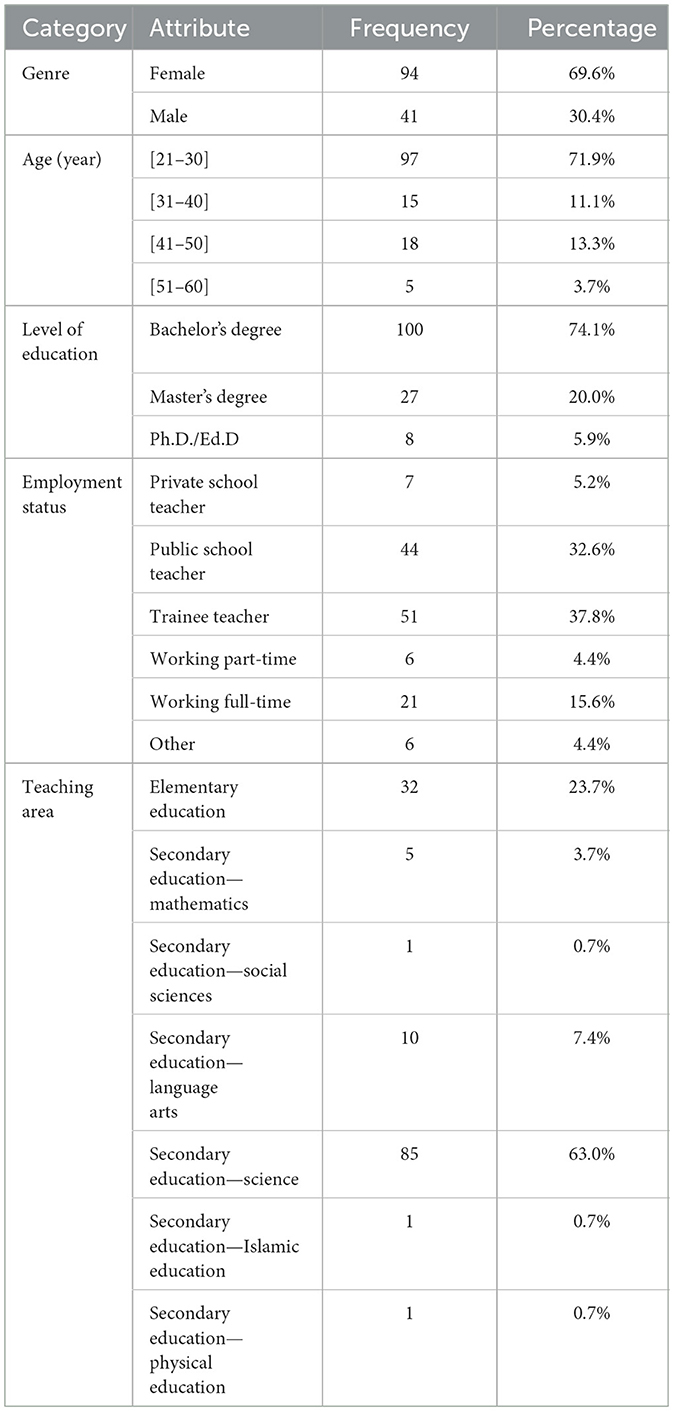
Table 1. Demographic and professional characteristics of the target public participating in the survey.
This demographic profile helps provide context for the study findings, ensuring that interpretations are grounded in an understanding of the participant population.
Research instruments
To assess teachers' effectiveness in implementing gender-responsive pedagogy, this study relied on the Teacher Efficacy for Gender Equality Practices (TEGEP) scale developed by Miralles-Cardona et al. (2021). This instrument measures teachers' efficacy and competence in promoting gender equality within educational settings. The questionnaire assesses three key dimensions: knowledge, attitudes, and instructional practices that contribute to the creation of a fair and inclusive learning environment for all genders. It comprises 31 items, organized into two main sections:
1st section: demographic information (5 items)
This section collects background data on participants, including gender, age, education level, teaching field, and employment status.
2nd section: teacher efficacy in gender-responsive pedagogy (26 items)
This section evaluates teachers' perceptions, confidence, and practices related to gender-responsive pedagogy. It is structured into three key dimensions, plus an overall measure of teacher efficacy:
Dimension 1: gender knowledge and awareness (11 items)
This dimension assesses teachers' understanding of gender-related issues, including:
• Gender roles and stereotypes
• Gender biases in education
• Knowledge of gender identity and expression
Teachers with a strong foundation in gender knowledge are more likely to identify and challenge inequalities in classroom interactions and promote gender equity in curriculum content.
Dimension 2: implementation of gender-responsive teaching methods (10 items)
This dimension measures how well teachers apply gender-responsive strategies in their teaching. Key indicators include:
• Use of inclusive language in instruction
• Selection of gender-fair teaching materials
• Fostering a classroom environment free from gender bias
Teachers who effectively implement gender-responsive methods create equitable learning spaces that support all students, regardless of gender identity.
Dimension 3: development of gender attitudes (5 items)
This dimension examines teachers' attitudes toward gender inclusivity and their ability to:
• Challenge traditional gender stereotypes
• Promote empathy and respect for gender diversity
• Encourage critical thinking about gender norms
Teachers who actively foster positive gender attitudes play a crucial role in helping students develop inclusive and equitable perspectives.
Overall teacher efficacy in gender-responsive pedagogy (26 items total)
This composite measure evaluates teachers' self-belief in their ability to implement gender-responsive pedagogy effectively. It integrates all three dimensions to assess how confident teachers feel in applying knowledge, using inclusive methods, and fostering gender-equitable attitudes in the classroom. Self-efficacy in gender-responsive pedagogy may influence teaching practices and will be examined further in the analysis.
Data collection
To ensure a structured and ethical data collection process, we first submitted a formal request to the Director of The Regional Centre for Education and Training Professions Casablanca-Settat, seeking authorization to administer the survey questionnaire among teachers-in-training. This step was essential to obtain institutional approval and ensure compliance with ethical research guidelines. In alignment with best practices in research ethics, we strictly adhered to principles of confidentiality, anonymity, and informed consent (Mellinger and Hanson, 2016). Participants were informed about the purpose of the study, their voluntary participation, and their right to withdraw at any time without consequences.
The survey questionnaire was administered electronically via Google Forms, facilitating ease of access and efficient data collection. Upon completion of the data collection phase, the responses were systematically encoded using Microsoft Excel. The encoded data were subsequently subjected to statistical processing to ensure accuracy and reliability in the analysis.
Data analysis
The collected survey data were analyzed using SPSS (Version 27), employing a range of statistical tools to extract meaningful insights. The primary statistical methods included mean, standard deviation, Student's t-test, ANOVA and Pearson's correlation coefficient (r).
The mean was calculated to evaluate various aspects of gender awareness, the extent of gender approach implementation, and the development of gender-related attitudes among the target population. It also served to assess the efficacy of teachers and future teachers in applying gender-responsive teaching practices. Table 2 presents the average scores obtained for each of the dimensions examined in the study.
The standard deviation (SD) was used to measure the degree of dispersion in the dataset, providing insights into the variability in participants' responses. Furthermore, to examine the influence of key demographic variables on the studied dimensions, different statistical tests were applied based on the nature of the variables. Specifically, the Student's t-test was used to assess gender differences, while one-way ANOVA was employed to analyze the effects of other demographic variables such as age, level of education, educational cycle, and employment status. These tests enabled the identification of statistically significant differences across the relevant groups.
Lastly, Pearson's correlation coefficient (r) was applied to assess the strength and significance of relationships among different dimensions, particularly with regard to the efficacy of teachers and future teachers in implementing gender-responsive teaching practices. This analysis helped determine whether specific factors had a significant impact on participants' ability to integrate gender-responsive pedagogy into their teaching methodologies.
Results
Evaluation of average scores for each dimension
The questionnaire used to assess the efficacy of teachers and future teachers in practicing the gender approach consisted of 26 items related to the research focus. These items were categorized into three dimensions: Gender Knowledge and Awareness, which included 11 items; Implementing a Gender-Responsive Pedagogy, which contained 10 items; and Developing Gender Attitudes, which comprised 5 items. Additionally, an overall dimension measured teachers' efficacy in practicing the gender approach.
The average scores obtained for each dimension, as presented in Table 3, indicate that teachers and future teachers exhibit a clear to evident level of gender knowledge and awareness, with a mean score of 32.50 (SD = 12.94). Similarly, the mean score for the implementation of gender-responsive teaching methods was 38.47 (SD = 12.56), suggesting a clear and sometimes evident level of application, as classified by the rating scale. In contrast, the development of gender-related attitudes and behaviors was found to be high and evident, with an average score of 21.30 (SD = 7.44). Regarding overall efficacy in practicing the gender approach, the study recorded an average score of 92.28 (SD = 28.03), indicating that teachers and future teachers in the Casablanca-Settat region demonstrate a clear to evident level of competency in integrating gender-responsive practices into their teaching.
Impact of variables on the studied dimensions
To assess the influence of demographic and professional variables on the studied dimensions, the Student's t-test was used for the gender variable, and one-way ANOVA was applied for other variables such as age, education level, teaching area, and employment status. These analyses aimed to identify whether these factors significantly affected teachers' and future teachers' gender awareness, use of gender-responsive methods, and related attitudes, as well as their overall effectiveness in applying a gender-responsive approach.
Effect of gender on the dimensions
Minor variations in mean scores were observed between male and female participants in the studied dimensions (Figure 1). Specifically, in the Gender Knowledge and Awareness dimension, men scored slightly higher (M = 34.39) than women (M = 32.04), but this difference was not statistically significant (p = 0.333 > 0.05). Conversely, in the Development of Gender-Related Behaviors dimension, women had slightly higher mean scores (M = 21.99) compared to men (M = 19.73), although this difference was not statistically significant (p = 0.105 > 0.05). Furthermore, the use of gender-responsive teaching methods showed similar results between men and women (p = 0.662 > 0.05), suggesting that gender does not influence the application of these methods. Similarly, no significant gender-based differences were found in terms of overall effectiveness in practicing the gender approach (p = 0.812), with men and women demonstrating similar levels of competence in applying gender-responsive teaching strategies.
Effect of age on the dimensions
The analysis of age groups, illustrated in Figure 2, revealed some variations in mean scores across dimensions. For instance, the mean score for Gender Knowledge and Awareness ranged from 29.4 to 39.4 depending on the age group. However, ANOVA results (Table 4) showed that these differences were not statistically significant, as confirmed by an F-value of 1.960 and a significance level of 0.123. Furthermore, the implementation of gender-sensitive teaching methods remained relatively consistent across different age groups, indicating that age does not significantly impact teachers' use of gender-inclusive pedagogical strategies. The F-values for all dimensions were close to the significance threshold but did not reach statistical significance. The Eta squared values indicated weak effects of age, with the highest values recorded for the Development of Gender-Related Behaviors dimension (0.057) and the overall dimension (0.052).
Effect of education level on the studied dimensions
Although slight variations in mean scores were observed across different levels of education (Figure 3), ANOVA results presented in Table 5 indicated no statistically significant differences. In the Gender Knowledge and Awareness dimension, mean scores ranged from 30.93 among those with a Master's degree to 35.63 among those with a PhD, but this variation was not statistically significant (F = 0.493; Sig. = 0.612). Similarly, for the Implementation of Gender-Sensitive Teaching Methods dimension, scores varied slightly from 38.20 among Bachelor's degree holders to 40.88 among Ph.D. holders, but again, the differences were not statistically significant (F = 0.176; Sig. = 0.839). Overall, education level did not have a significant impact on any of the studied dimensions, as evidenced by the low F-values and high p-values. The Eta squared values further indicated negligible effects of education level on gender-related competencies.
Effect of teaching area on the studied dimensions
Although mean scores varied across different teaching areas, as illustrated in Figure 4, no statistically significant differences were found. For example, in the Gender Knowledge and Awareness dimension, mean scores ranged from 27 to 50 depending on the teaching area, but the difference was not statistically significant (F = 1.882; Sig. = 0.089) (Table 6). Similarly, in the Implementation of Gender-Sensitive Teaching Methods dimension, mean scores varied from 35.80 among Secondary Mathematics teachers to 51.00 among Islamic Education teachers, but this difference was not statistically significant (F = 0.265; Sig. = 0.952). These findings suggest that the teaching field does not significantly influence the efficacy of teachers in practicing the gender approach.
Effect of employment status on the studied dimensions
As shown in Figure 5 and Table 7, while some variations in mean scores were observed based on employment status, none of these differences were statistically significant. In the Development of Gender-Related Behaviors and Attitudes dimension, the mean score was 18.57 for private school teachers and 20.86 for public school teachers, but this difference was not significant (F = 0.425; Sig. = 0.830). The p-values for all dimensions were well above 0.05, confirming that employment status has no significant effect on teachers' gender-responsive competencies.
Correlations between studied dimensions and teachers' efficacy in practicing the gender approach
Table 8 presents the correlation analysis between Gender Knowledge and Awareness, Implementation of Gender-Responsive Teaching Methods, Development of Gender-Related Attitudes and Behaviors, and overall efficacy in practicing the gender approach. The results indicate a highly significant relationship (p < 0.001) between each dimension and the overall efficacy of teachers in practicing the gender approach. Specifically, the correlation value between Gender Knowledge and Awareness and overall efficacy was r = 0.811, indicating a strong positive relationship. This suggests that teachers with greater knowledge and awareness of gender issues are more competent in applying gender-responsive practices. Similarly, a correlation of r = 0.905 between Implementation of Gender-Responsive Teaching Methods and overall efficacy suggests a very strong relationship, reinforcing the idea that teachers proficient in gender-responsive pedagogy tend to implement inclusive teaching practices more effectively. Furthermore, the correlation between teacher efficacy and the Development of Gender-Related Attitudes and Behaviors was r = 0.832, indicating that teachers who demonstrate strong gender-related attitudes foster more inclusive and egalitarian classroom environments.

Table 8. Statistical significance between gender awareness, implementation of gender-sensitive teaching methods, development of gender-related behaviors and teacher efficacy in practicing the gender approach.
These findings highlight the importance of teacher training and awareness in enhancing gender-responsive teaching competencies and suggest that professional development efforts should focus on strengthening teachers' gender knowledge and pedagogical strategies to create more equitable educational environments.
Discussion
The statistical analysis of the questionnaire data collected from teachers and future teachers in the Casablanca-Settat region of Morocco revealed that their levels of knowledge and awareness of the gender approach, their implementation of gender-responsive pedagogical practices, and their development of gender-related behaviors and attitudes were clear and, in some cases, evident. Similarly, the overall efficacy of teachers and future teachers in practicing the gender approach was found to be at a clear level. Student's t-test and ANOVA results showed no significant differences in any of the studied dimensions based on demographic and professional characteristics, including gender, age, level of education, teaching field, and employment status. However, measures of association (Eta and Eta squared) indicated small effect sizes for most comparisons, suggesting that these independent variables had only a limited effect on the dimensions assessed. The lack of significant differences in the study may be attributed to the overall homogeneity of the sample, both demographically and professionally, which limits variability (Cohen, 1988). Teachers often share similar training, institutional environments, and pedagogical norms, leading to comparable gender-related practices (UNESCO, 2015b). In addition, prevailing traditional cultural norms may shape uniform attitudes and behaviors toward gender, regardless of individual characteristics (Aikman and Unterhalter, 2005). The absence of targeted institutional policies on gender training may also contribute to this uniformity (Morley, 2006; Subrahmanian, 2005).
Despite the lack of significant differences across demographic and occupational groups, the study found strong and positive correlations between teachers' gender competencies and their knowledge, teaching methods, and developed behaviors. The high statistical significance at the 0.01 level suggests that these correlations are not due to random variation but reflect meaningful relationships. These findings underscore the importance of gender training in enhancing teachers' pedagogical effectiveness. Prior research has shown that teacher training programs incorporating gender-related components improve educators' awareness and ability to implement gender-responsive pedagogy (Reader, 2013; Adeyemi and Akhigbe, 2020). Increased knowledge of gender issues enables teachers to recognize and challenge gender stereotypes, thereby fostering a more equitable learning environment (Ayers and Wade, 2003). Moreover, Andrews et al. (2020) have demonstrated that teachers' gender sensitivity significantly influences both the learning environment and student outcomes.
Gender-responsive pedagogical practices have been widely recognized as critical to improving educational outcomes and fostering student wellbeing (Karlson and Simonsson, 2011). Teachers who integrate inclusive, gender-responsive methods create a more positive classroom climate, encouraging the active participation of all students (Francis and Paechter, 2015). The strong correlation found in this study (r = 0.905) aligns with these findings, suggesting that teachers' gender competencies directly translate into more inclusive teaching practices.
The development of gender-related behaviors among students is also significantly shaped by their interactions with teachers and peers. As social learning theorist Bandura (1986) suggests, teachers play a crucial role in modeling gender behaviors and attitudes. Research has demonstrated that pedagogical interventions promoting critical engagement with gender norms can lead to meaningful changes in students' perceptions and behaviors (Karlson and Simonsson, 2011). The strong correlation (r = 0.832) observed in this study suggests that teachers who possess strong gender competencies are more likely to foster inclusive and egalitarian behaviors among their students.
In the African context, studies on teachers' awareness and knowledge of gender-responsive pedagogy (Lewin and Akyeampong, 2009; Muasya, 2021; Ennaji, 2018) indicate that while many educators acknowledge the importance of gender issues, their practical application of gender-responsive teaching strategies remains limited. This highlights the urgent need to revise teacher training programs to incorporate comprehensive gender-related content, ensuring that teachers are adequately equipped to promote gender equality in the classroom.
Conclusion
The findings of this study indicate that both trainee and practicing teachers in the Casablanca-Settat region exhibit a clear and, in some cases, evident level of knowledge, awareness, implementation, and attitudes related to gender-responsive pedagogy. These competencies, in turn, influence their self-efficacy in practicing gender-responsive pedagogy. Furthermore, significant and positive correlations were found between teachers' effectiveness in gender-responsive teaching and their knowledge and awareness of gender issues, their use of gender-responsive teaching methods, and their ability to foster gender-inclusive behaviors in students. These results align with existing research that highlights the importance of gender training in improving pedagogical practices and promoting equitable learning environments.
Additionally, the Student's t-test and ANOVA results demonstrated that demographic and professional factors—including gender, age, education level, teaching field, and employment status—did not have any significant effect on the studied dimensions related to gender awareness, knowledge, and practice. This suggests that these characteristics do not significantly influence participants' gender-related attitudes and behaviors. The weak measures of association further confirm the absence of strong relationships between these variables and the studied dimensions, implying that other, unmeasured factors may have a more substantial impact on gender-responsive pedagogical practices.
Given the crucial role of gender-responsive pedagogy in advancing equal opportunities and empowering students of all genders, particularly in developing countries, it is essential to address systemic gender inequalities, challenge stereotypes, and create inclusive educational environments. By adopting gender-responsive teaching strategies, educators can contribute to fostering a more just and equitable society.
Implications
Based on the findings of this study, several key recommendations for implications can be made to enhance gender-responsive pedagogy in Morocco. First, it is essential to integrate gender-responsive pedagogy into teacher training programs to ensure that educators are equipped with the necessary knowledge and skills to foster gender-inclusive learning environments. This should include specific training modules focused on recognizing and addressing gender biases, as well as practical strategies for implementing gender-responsive teaching methods.
Second, professional development initiatives such as workshops and training sessions should be introduced to help practicing teachers develop and refine gender-responsive teaching strategies. These initiatives should focus on equipping teachers with tools to identify and address students' diverse educational needs through an inclusive pedagogical approach.
Third, policymakers and educational institutions should prioritize the systematic inclusion of gender-related content in curricula, ensuring that future teachers are prepared to create learning environments that promote gender equity. Additionally, ongoing monitoring and assessment should be implemented to evaluate the effectiveness of gender-responsive teaching interventions and make necessary adjustments to improve outcomes.
Finally, further research should be conducted to explore additional factors influencing teachers' gender-responsive practices, particularly through qualitative methods that capture the contextual and cultural dimensions of gender-responsive education.
Limitations
This study has several limitations that should be acknowledged. One key limitation of the quantitative approach is its inability to capture the complexity of gender-responsive pedagogy within its natural context. The effectiveness of gender-responsive teaching is highly contextual, influenced by cultural, institutional, and individual factors that may not be fully accounted for in quantitative analysis. Future research should incorporate qualitative methodologies such as interviews and classroom observations to gain a deeper understanding of how gender-responsive pedagogy is applied in practice.
Another limitation relates to the representativeness of the sample. In quantitative research, sample diversity is crucial for ensuring that results are generalizable. If the sample does not adequately reflect the broader population of teachers and future teachers, the findings may be limited in their applicability. Given the diverse experiences and perspectives that influence gender-responsive pedagogy, it is important to ensure that future studies include a broader and more representative sample.
Additionally, while the study found strong correlations between gender-related competencies and teaching effectiveness, correlation does not imply causation. Further research using longitudinal or experimental designs would be beneficial to establish causal relationships between gender training and improved teaching efficacy.
Despite these limitations, this study provides valuable insights into the current state of gender-responsive pedagogy among teachers and future teachers in Morocco. By addressing these limitations through future research, a more comprehensive understanding of how to enhance gender-responsive teaching practices can be developed.
Data availability statement
The original contributions presented in the study are included in the article/supplementary material, further inquiries can be directed to the corresponding author.
Ethics statement
Ethical review and approval was not required for the study on human participants in accordance with the local legislation and institutional requirements. Written informed consent from the participants or participant's legal guardian/next of kin was not required to participate in this study in accordance with the national legislation and the institutional requirements.
Author contributions
EA: Conceptualization, Software, Writing – review & editing, Resources, Investigation, Writing – original draft, Project administration, Validation, Formal analysis, Methodology, Supervision, Data curation. BSa: Resources, Formal analysis, Writing – review & editing, Conceptualization, Investigation. BM: Formal analysis, Investigation, Writing – original draft, Conceptualization, Resources. BA: Writing – review & editing, Resources, Software, Conceptualization, Methodology, Investigation. EM: Software, Investigation, Writing – original draft, Data curation, Formal analysis. BSm: Investigation, Data curation, Writing – original draft.
Funding
The author(s) declare that financial support was received for the research and/or publication of this article. This document has been made possible by the support of the American people through the United States Agency for International Development (USAID). The contents of this publication are the sole responsibility of the authors, and do not necessarily reflect the views of USAID or the United States Government.
Conflict of interest
The authors declare that the research was conducted in the absence of any commercial or financial relationships that could be construed as a potential conflict of interest.
Generative AI statement
The author(s) declare that no Gen AI was used in the creation of this manuscript.
Publisher's note
All claims expressed in this article are solely those of the authors and do not necessarily represent those of their affiliated organizations, or those of the publisher, the editors and the reviewers. Any product that may be evaluated in this article, or claim that may be made by its manufacturer, is not guaranteed or endorsed by the publisher.
References
Adeyemi, A. E., and Akhigbe, J. N. (2020). Using gender responsive collaborative learning strategy to improve students' achievement and attitude towards learning science in virtual and hands-on laboratory environments. J. Pedag. Res. 4, 241–261. doi: 10.33902/JPR.2021063948
Aikman, S., and Unterhalter, E. (Eds.). (2005). Beyond Access: Transforming Policy and Practice for Gender Equality in Education. Oxfam Publishing. Available online at: https://oxfamilibrary.openrepository.com/bitstream/10546/115410/5/bk-beyond-access-010905-en.pdf (Accessed October 21, 2024).
Ananga, E. D. (2021). Gender responsive pedagogy for teaching and learning: the practice in Ghana's initial teacher education programme. Creat. Educ. 12, 848–864. doi: 10.4236/ce.2021.124061
Andrews, N. C. Z., Cook, R. E., Nielson, M. G., Xiao, S. X., and Martin, C. L. (2020). “Gender in education,” in Social and Emotional Learning Section. Encyclopedia of Education, eds. T. L. Spinrad, J. Liew, and D. Fisher (New York, NY: Routledge; Taylor & Francis), 1–26. Available online at: https://education.routledgeresearchencyclopedias.com/social-and-emotional-learning
Andrews, N. C. Z., Motz, M., and Pepler, D. J. (2021). A national implementation of a community-based intervention for mothers experiencing violence in relationships. J. Fam. Psychol. 35, 92–102. doi: 10.1037/fam0000810
Ayers, W. M., and Wade, P. (2003). Integrating Gender into the Curriculum: Strategies and Resources for K-12 Classrooms. Thousand Oaks, CA: Corwin Press.
Bandura, A. (1986). Social Foundations of Thought and Action: A Social-Cognitive Theory. Englewood Cliffs, NJ: Prentice-Hall Inc.
Chapin, J., Mai, S., and Verity, W. (2020). Integrating Gender Responsive Pedagogy into Higher Education: Our Approach. INASP. Available online at: https://www.inasp.info/publications (Accessed October 21, 2024).
Charrad, M. M. (2012). Family law reforms in the Arab world: Tunisia and Morocco. J. North Afr. Stud. 17, 209–223. Available online at: https://www.un.org/esa/socdev/family/docs/egm12/PAPERCHARRAD.pdf
Cohen, J. (1988). Statistical Power Analysis for the Behavioral Sciences, 2nd Edn. Lawrence ErlbaumAssociates. Available online at: https://www.utstat.toronto.edu/brunner/oldclass/378f16/readings/CohenPower.pdf (Accessed October 21, 2024).
Council on the Status of Women (2016). Gender Equality in the School Environment. Available online at: https://www.csf.gouv.qc.ca/wp-content/uploads/avis_egalite_entre_sexes_milieu-scolaire.pdf (Accessed October 21, 2024).
Council on the Status of Women (2017). Gender Equality in Schools: Far From a Perfect Score. Government of Quebec. Available online at: https://www.csf.gouv.qc.ca/publications/egalite-sexes-ecole-loin-note-parfaite (Accessed October 21, 2024).
Dee, T. S. (2007). Teachers and the gender gaps in student achievement. J. Hum. Resour. 42, 528–554. doi: 10.3368/jhr.XLII.3.528
Egenson, P. A., and Knoll, M. A. (2016). Impact of teacher training on gender-responsive teaching practices: a systematic review and meta-analysis. Rev. Educ. Res. 86, 370–400.
Ennaji, M. (2018). Morocco's experience with gender gap reduction in education. Gend. Womens Stud. 2, 1–17. doi: 10.31532/GendWomensStud.2.1.005
Francis, B., and Paechter, C. (2015). The problem of gender categorisation: addressing dilemmas past and present in gender and education research. Gend. Educ. 27, 1–15. doi: 10.1080/09540253.2015.1092503
Gabriel, D. (2021). Race, ethnicity and gendered educational intersections. Gend. Educ. 33, 791–797. doi: 10.1080/09540253.2021.1967667
Golzar, J., Noor, S., and Tadjik, O. (2022). Convenience sampling. Int. J. Educ. Lang. Stud. 1, 72–77. doi: 10.22034/ijels.2022.162981
Hoque, K. E., Abdul Razak, A. Z., Zohora, F., and Islam, R. (2013). Impact of teacher-gender on primary students' achievement: a study at Malaysian standpoint. J. Sociol. Res. 4, 123–144. doi: 10.5296/jsr.v4i1.3295
Huang, C. (2013). Gender differences in academic self-efficacy: a meta-analysis. Eur. J. Psychol. Educ. 28, 1–35. doi: 10.1007/s10212-011-0097-y
Inter-Agency Network for Education in Emergencies (2010). Gender Equality in and Through Education. INEE. Available online at: https://inee.org/resources/gender-equality-education-and-through-education (Accessed October 21, 2024).
Jarlégan, A. (2009). L'intérêt de la prise en compte du genre en éducation. Rech. Éduc. 2, 11–21. doi: 10.4000/rechercheseducations.500
Karlson, I., and Simonsson, M. (2011). A question of gender-responsive pedagogy: discourses in pedagogical guidelines. Contemp. Issues Early Childh. 12:274. doi: 10.2304/ciec.2011.12.3.274
Lee, S. M. (2021). Exploring gender-responsive pedagogy for STEM education. Int. J. Res. 7, 47–59. Available online at: https://www.iisrr.in/mainsite/wpcontent/uploads/2021/10/6.-Shok-Mee-LEE-Exploring-Gender-Responsive-Pedagogy-for-STEM-Education.pdf
Lewin, K. M., and Akyeampong, K. (2009). Education in sub-Saharan Africa: researching access, transitions and equity. Comp. Educ. 45, 143–150. doi: 10.1080/03050060902920492
Mellinger, C., and Hanson, T. (2016). Quantitative Research Methods in Translation and Interpreting Studies.London: Routledge. doi: 10.4324/9781315647845
Meyer, A., Rose, D. H., and Gordon, D. (2014). Universal Design for Learning: Theory and practice. Wakefield, MA: CAST Professional.
Miralles-Cardona, C., Chiner, E., and Cardona-Moltó, M.-C. (2021). Educating prospective teachers for a sustainable gender equality practice: survey design and validation of a self-efficacy scale. Int. J. Sust. High. Educ. 23, 379–403. doi: 10.1108/IJSHE-06-2020-0204
Morley, L. (2006). Hidden transcripts: the micropolitics of gender in Commonwealth universities. Womens Stud. Int. Forum 29, 543–551. doi: 10.1016/j.wsif.2006.10.007
Muasya, J. N. (2021). Gender responsive pedagogy and early childhood teacher education: a study of pre-primary school teachers in Nairobi County, Kenya. Teach. Educ. Curric. Stud. 6, 101–108. doi: 10.11648/j.tecs.20210603.15
Mukagiahana, J., Sibomana, A., and Ndiritu, J. (2024). Teachers' understanding of gender responsive pedagogy and its application in the teaching process: case after teacher training program interventions in Rwanda. J. Pedag. Res. 8, 280–293. doi: 10.33902/JPR.202423067
National Charter for Education and Training (1999). National Charter for Education and Training. Rabat: Ministry of National Education.
Reader, M. K. (2013). Gender studies components in teacher training: an essential requirement for teacher empowerment and gender justice in the 21st century. Int. J. Educ. Psychol. Res. 2, 46–50. Available online at: https://ijepr.org/volume/2/issue/2
Sadiqi, F. (2008). The central role of the family law in the Moroccan feminist movement. Br. J. Middle East. Stud. 35, 325–337. doi: 10.1080/13530190802525098
Smith, F., Hardman, F., and Higgins, S. (2007). Gender inequality in the primary classroom: will interactive whiteboards help? Gend. Educ. 19, 455–469. doi: 10.1080/09540250701442658
Subrahmanian, R. (2005). Gender equality in education: definitions and measurements. Int. J. Educ. Dev. 25, 395–407. doi: 10.1016/j.ijedudev.2005.04.003
Sule, A., Seda, E., and Ipek, M. (2018). Gender stereotypes in the classroom and effects on achievement. Rev. Econ. Stat. 100, 876–890. doi: 10.1162/rest_a_00756
UNESCO (2015a). A Guide for Gender Equality in Teacher Education Policy and Practices. UNESCO. Available online at: https://unesdoc.unesco.org/ark:/48223/pf0000231646 (Accessed October 21, 2024).
UNESCO (2015b). Implementing Gender-Based Pedagogy: A Practical Guide for Educators. Paris: UNESCO. Available online at: https://unesdoc.unesco.org/ark:/48223/pf0000375869 (Accessed October 21, 2024).
UNGEI (2017). Guide pour L'égalité des Genres dans les Politiques et les Pratiques de Formation des Enseignants. Paris: UNESCO. Available online at: https://unesdoc.unesco.org/ark:/48223/pf0000375869 (Accessed October 21, 2024).
United Nations (1980). The Second World Conference of the United Nations Decade for Women, Copenhagen 1980. New York, NY: United Nations.
United Nations (1985). The Third World Conference to Review and Appraise the Outcomes of the United Nations Decade for Women: Equality, Development and Peace, Nairobi 1985. New York, NY: United Nations.
United Nations (1995). Report of the Fourth World Conference on Women, Beijing, 4-15 September 1995. New York, NY: United Nations.
Unterhalter, E. (2005). “Fragmented frameworks: researching women, gender, education and development,” in Beyond Access: Developing Gender Equality in Education, eds. S. Aikman and E. Unterhalter (Oxford: Oxfam Publishing), 15–35. doi: 10.3362/9780855986605.001
West, C., and Zimmerman, D. H. (1987). Doing gender. Gend. Soc. 1, 125–151. doi: 10.1177/0891243287001002002
World Bank (2017). World Development Report 2018: Learning to Realize Education's Promise. Washington, DC: World Bank. doi: 10.1596/978-1-4648-1096-1
Keywords: gender-responsive pedagogy, personal effectiveness, teachers, future teachers, Morocco
Citation: Aafaf E, Sabah B, Marya B, Aziz B, Mohamed EH and Smail B (2025) Assessment of the personnel-efficacy of Moroccan teachers and future teachers in the practice of gender-responsive pedagogy: case study of the Casablanca-Settat region. Front. Educ. 10:1602163. doi: 10.3389/feduc.2025.1602163
Received: 28 March 2025; Accepted: 15 July 2025;
Published: 06 August 2025.
Edited by:
Abdessamad Fatmi, Al Akhawayn University, MoroccoReviewed by:
Hicham Fatmi, Moulay Ismail University, MoroccoAli Ait Si Mhamed, Mohammed VI Polytechnic University, Morocco
Copyright © 2025 Aafaf, Sabah, Marya, Aziz, Mohamed and Smail. This is an open-access article distributed under the terms of the Creative Commons Attribution License (CC BY). The use, distribution or reproduction in other forums is permitted, provided the original author(s) and the copyright owner(s) are credited and that the original publication in this journal is cited, in accordance with accepted academic practice. No use, distribution or reproduction is permitted which does not comply with these terms.
*Correspondence: Essedaoui Aafaf, ZXNzZWRhb3VpYWFmYWYyMEBnbWFpbC5jb20=
 Essedaoui Aafaf
Essedaoui Aafaf Belaaouja Sabah2
Belaaouja Sabah2 Boukhair Aziz
Boukhair Aziz
